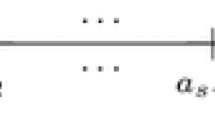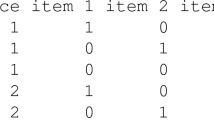Abstract
This article provides an overview of recent results on lexicographic, linear, and Bayesian models for paired comparison from a cognitive psychology perspective. Within each class, we distinguish subclasses according to the computational complexity required for parameter setting. We identify the optimal model in each class, where optimality is defined with respect to performance when fitting known data. Although not optimal when fitting data, simple models can be astonishingly accurate when generalizing to new data. A simple heuristic belonging to the class of lexicographic models is Take The Best (Gigerenzer & Goldstein (1996) Psychol. Rev. 102: 684). It is more robust than other lexicographic strategies which use complex procedures to establish a cue hierarchy. In fact, it is robust due to its simplicity, not despite it. Similarly, Take The Best looks up only a fraction of the information that linear and Bayesian models require; yet it achieves performance comparable to that of models which integrate information. Due to its simplicity, frugality, and accuracy, Take The Best is a plausible candidate for a psychological model in the tradition of bounded rationality. We review empirical evidence showing the descriptive validity of fast and frugal heuristics.
Similar content being viewed by others
REFERENCES
Ayton, P. and Önkal, D. (1997), Forecasting football fixtures: Confidence and judged proportion correct, Unpublished manuscript.
Berretty, P. M. (2001), Cue preference in a multidimensional categorizataion task, Manuscript submitted for publication.
Berretty, P. M., Todd, P. M. and Martignon, L. (1999), Using few cues to choose: Fast and frugal categorization, In G. Gigerenzer, P. M. Todd and the ABC Research Group, Simple Heuristics That Make Us Smart (pp. 235–254), New York: Oxford University Press.
Borges, B., Goldstein, D. G., Ortmann, A. and Gigerenzer, G. (1999), Can ignorance beat the stock market?, in G. Gigerenzer, P. M. Todd and the ABC Research Group, Simple Heuristics That Make Us Smart (pp. 59–72), New York: Oxford University Press.
Breiman, L., Friedman, J. H., Olshen, R. A. and Stone, C. J. (1993), Classification and Regression Trees, New York: Chapman and Hall.
Bröder, A. (2000), Assessing the empirical validity of the ‘Take The Best’ heuristic as a model of human probabilistic inference, Journal of Experimental Psychology: Learning, Memory, and Cognition 26: 1332–1346.
Cooksey, R. W. (1996), Judgment Analysis: Theory, Methods, and Applications, San Diego, CA: Academic Press.
Cooper, G. (1990), The computational complexity of probabilistic inferences. Artificial Intelligence 42: 393–405.
Czerlinski, J., Gigerenzer, G. and Goldstein, D. G. (1999), How good are simple heuristics?, in G. Gigerenzer, P. M. Todd, and the ABC Research Group, Simple Heuristics That Make Us Smart (pp. 97–118), New York: Oxford University Press.
Dawes, R. M. (1979), The robust beauty of improper linear models in decision making, American Psychologist 34: 571–582.
Dawes, R. M. and Corrigan, B. (1974), Linear models in decision making, Psychological Bulletin 81: 95–106.
Dhami, M. and Harris, C. (2001), Fast and frugal versus regression models of human judgement, Thinking and Reasoning 7: 5–27.
Friedman, N. and Goldszmit, M. (1996), Learning Bayesian networks with local structure, in Proceedings of the 12th Conference on Uncertainty in Artificial Intelligence (UAI) (pp. 252–262), San Mateo, CA: Morgan Kaufmann.
Garey, M. R. and Johnson, D. S. (1979), Computers and Intractability: A Guide to the Theory of NP-Completeness, San Francisco, CA: W. H. Freeman.
Gigerenzer, G. (1981), Messung und Modellbildung in der Psychologie, Munich: Ernst Reinhard Verlag.
Gigerenzer, G., Czerlinski, J. and Martignon, L. (1999), How good are fast and frugal heuristics? in J. Shanteau, B. Mellers, and D. Schum (eds.), Decision Research from Bayesian Approaches to Normative Systems: Reflections on the Contributions of Ward Edwards. Norwell, MA: Kluwer Academic Publishers.
Gigerenzer, G. and Goldstein, D. G. (1996), Reasoning the fast and frugal way: Models of bounded rationality, Psychological Review 103: 650–669.
Gigerenzer, G. and Hoffrage, U. (1995), How to improve Bayesian reasoning without instruction: Frequency formats, Psychological Review 102: 684–704.
Gigerenzer, G., Hoffrage, U. and Kleinbölting, H. (1991). Probabilistic mental models: A brunswikian theory of confidence, Psychological Review 98: 506–528.
Gigerenzer, G. and Selten, R. (eds.) (2001), Bounded Rationality: The Adaptive Toolbox, Cambridge, MA: MIT Press.
Gigerenzer, G., Todd, P. M. and the ABC Research Group (1999), Simple Heuristics That Make Us Smart, New York: Oxford University Press.
Goldstein, D. G. and Gigerenzer, G. (1999), How ignorance makes us smart: The recognition heuristic, in G. Gigerenzer, P. M. Todd and the ABC Research Group, Simple Heuristics That Make Us Smart (pp. 37–58), New York: Oxford University Press.
Hasher, L. and Zacks, R. T. (1984), Automatic processing of fundamental information: The case of frequency of occurrence, American Psychologist 39: 1372–1388.
Hoffrage, U., Hertwig, R. and Gigerenzer, G. (2000), Hindsight bias: A by-product of knowledge updating?, Journal of Experimental Psychology: Learning, Memory, and Cognition 26: 566–581.
Hoffrage, U., Lindsey, S., Hertwig, R. and Gigerenzer, G. (2000), Communicating statistical information, Science 290: 2261–2262.
Holte, R. C. (1993), Very simple classification rules perform well on most commonly used datasets, Machine Learning 3 (11): 63–91.
Kahneman, D., Slovic, P. and Tversky, A. (1982), Judgment under Uncertainty: Heuristics and Biases, New York: Cambridge University Press.
Kass, R. and Raftery, A. (1995), Bayes Factors, Journal of the American Statistical Association 90: 430.
Krauss, S., Martignon, L. and Hoffrage U. (1999), Simplifying Bayesian inference: The general case, in L. Magnani, N. Nersessian and P. Thagard, (eds.), Model-Based Reasoning in Scientific Discovery (pp. 165–179), New York: Plenum Press.
Kurz, E. and Martignon, L. (1999), Weighing, then summing: The triumph and tumbling of a modeling practice in psychology, in L. Magnani, N. Nersessian and P. Thagard, (eds.), Model-Based Reasoning in Scientific Discovery (pp. 26–31), Pavia: Cariplo.
Lages, M., Hoffrage, U. and Gigerenzer, G. (1999), How heuristics produce intransitivity and how intransitivity can discriminate between heuristics, Manuscript submitted for publication.
Martignon, L. and Hoffrage, U. (1999), Why does one-reason decision making work? A case study in ecological rationality, in G. Gigerenzer, P. M. Todd, and the ABC Research Group, Simple Heuristics That Make Us Smart (pp. 119–140), New York: Oxford University Press.
Martignon, L. and Krauss, S. (in press), Can l’homme éclairé be fast and frugal? Reconciling Bayesianism and bounded rationality, in S. Schneider and J. Shanteau (eds.), Emerging Perspectives on Decision Research, Oxford, UK: Oxford University Press.
Martignon, L. and Laskey, K. B. (1999), Bayesian benchmarks for fast and frugal heuristics, in G. Gigerenzer, P. M. Todd and the ABC Research Group, Simple Heuristics That Make Us Smart (pp. 169–188), New York: Oxford University Press.
Martignon, L. and Schmitt, M. (1999), Simplicity and robustness of fast and frugal heuristics, Minds and machines 9: 565–593.
Payne, J. W., Bettman, J. R. and Johnson, E. J. (1988), Adaptive strategy selection in decision making, Journal of Experimental Psychology: Learning, Memory, & Cognition 14: 534–552.
Payne, J. W., Bettman, J. R. and Johnson, E. J. (1993), The Adaptive Decision Maker, New York: Cambridge University Press.
Pearl, J. (1988), Probabilistic Reasoning in Intelligent Systems, San Francisco, CA: Morgan Kaufmann.
Rieskamp, J. and Hoffrage, U. (1999), When do people use simple heuristics, and how can we tell?, in G. Gigerenzer, P. M. Todd and the ABC Research Group, Simple Heuristics That Make Us Smart (pp. 141–167). New York: Oxford University Press.
Rivest, R. J. (1987), Learning decision lists, Machine Learning 2: 229–246.
Shannon, C. (1948), A mathematical theory of communication, Bell Systems Technical Journal 27: 379–423, 623–656.
Slegers, D. W., Brake, G. L. and Doherty, M. E. (2000), Probabilistic mental models with continuous predictors, Organizational Behavior and Human Decision Processes 81: 98–114.
Todd, P.M., Gigerenzer, G. and the ABC Research Group (2000), How can we open up the adaptive toolbox? (Reply to commentaries) Behavioral and Brain Sciences 23: 767–780.
Tversky, A. and Kahneman, D. (1974), Judgment under uncertainty: Heuristics and biases, Science 185: 1124–1131.
Author information
Authors and Affiliations
Rights and permissions
About this article
Cite this article
Martignon, L., Hoffrage, U. Fast, frugal, and fit: Simple heuristics for paired comparison. Theory and Decision 52, 29–71 (2002). https://doi.org/10.1023/A:1015516217425
Issue Date:
DOI: https://doi.org/10.1023/A:1015516217425




